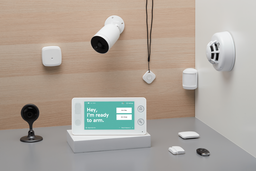Are Laser Security Systems Real?
Link Copied
The short answer is—yes. But they don't work the way they're portrayed in movies.
If you've ever seen Get Smart, Ocean's 11, or any other spy or heist movie, you are probably familiar with the trope of a security system that utilizes laser beams. The hero usually needs to navigate his way through the lasers by using a combination of yoga and crazy ninja moves. This is possible because he can see exactly where the lasers are, as they are a combination of crisscrossing red lines.
In real life, laser beams on security systems are not usually visible red lines, and many are actually invisible. In security alarm systems, lasers serve to provide stealthy home security that's hard for burglars to get past. Depending on the alarm system you set up, the intruder may or may not even realize that he has triggered an alarm, which will allow more time for the authorities to catch him.
If you are considering a home security system of any kind, you may consider incorporating laser tripwires into the mix! You'll want to keep in mind that most standard security systems don't provide laser tripwires, but that doesn't mean you can't supplement your security system with a fun side project!

What is a Laser?
The word "laser" is actually an acronym for "Light amplification by stimulated emission of radiation". Essentially, a laser concentrates light to create a straight, ultra-bright beam. Lasers have multiple uses, including hair removal, eye repair, and material cutting. Nowadays, some dentists even use lasers instead of drills when filling small cavities. And, as we are discussing in this post, they can also be a fun addition to a home security system.
Lasers are made up of three main components:
-
A pump, or pump source, which provides energy to the laser system. This can also be referred to as a power supply. This can be anything from a lamp to a chemical reaction. Without an energy source, the laser would not have anything to amplify.
-
The laser medium is the medium through which the energy is filtered, and determines the wavelength of light that the laser will emit. This is also referred to as the gain medium. The gain medium can be solid, liquid, or gas, depending on the type of laser.
-
The optical resonator (or the optical cavity) consists of mirrors that concentrate the light or energy by reflecting it back into the gain medium, which then amplifies the total light emitted by the laser.
Some lasers use multiple small mirrors in order to reach the amount of concentration necessary for their use. For a security system, lasers don’t need to be particularly strong, they just need to create a beam that will be broken when someone tries to cross it. By contrast, in the field of medicine, more concentrated levels are needed to perform eye surgery or dental surgery.
How Are Lasers Used in Home Security?
1. Laser tripwire: You may already be familiar with this concept, but a tripwire is a wire that is stretched taut across a path and triggers an alarm when it is disturbed. Laser tripwires follow a similar concept. The beam of laser light is shined across the path into some kind of receiver on the other side of the path. When the laser beam is broken, the alarm is triggered. This alarm can be located inside the house, or it can even be a text message sent to your cell phone.
2. Laser fence: Laser fences are essentially big nets of laser tripwires. They are set up all the way around the perimeter of a home. Having a laser fence ensures that you are notified whenever someone breaks through the perimeter of your home. Depending on the strength and concentration of the lasers, a laser fence can actually cause physical damage to someone who tries to cross it.
Homemade Laser Security
There are also some fairly easy do-it-yourself laser alarms that you can put up just about anywhere. YouTube is full of DIY project tutorials on how to make simple security systems out of a laser pointer.
It's actually fairly easy to create your own homemade laser security alarm using something as simple as a laser pointer. These are created by setting up the laser pointer and reflecting it against a light sensor. This sensor is hooked up to a circuit board of some kind, which then talks to a computer that has been coded to do an action (whether that means sounding a buzzer or sending you a text message). When the beam of the laser pointer is broken, a switch will flip on the circuit board, which will then trigger the computerized response, notifying you of any intruders in the area.

Should You Get a Laser Security System?
You might consider purchasing a security system with lasers incorporated for any of the following reasons:
-
You are protecting a particularly important or valuable item that is on display. In this case, lasers are simple and effective, as long as they are paired with the rest of a security system. Motion sensors can tell you that someone is in the building. Lasers can tell you what they are after. For this reason, many museums incorporate laser systems into their security.
-
You want an invisible perimeter. If you are hoping to protect your home, honestly, a fence or big wall can be a great deterrent to burglars. But if you do not want a large fence, a laser system can serve you well. It can’t physically prevent someone from crossing your perimeter, but it will notify you if someone does.
-
You are protecting your area. Simple laser pointer security systems are used by many people in apartments and offices. A laser alarm is a great way to alert yourself when your boss is approaching your office. A homemade laser system is also a great way to keep your roommates out of your food, or at least catch them in the act of taking it.
As we’ve already mentioned, an infrared motion detector can be just as helpful as a laser system, it just depends on what you are going for. Both options are relatively cheap and easy to set up, although more security systems sell motion detection technology than laser technology.

Other Parts of Home Security Systems: Cove
Lasers are not the only important components of a home security system, and in fact, many security systems are really effective without lasers. Although we understand if you'd really like to have a laser based system since those are pretty cool. The downside of a laser security system is the likelihood of false alarms. If anything breaks the beam of light, the alarm will be triggered, which could become rather annoying after a while. Here are a few other features of our own security system for you to explore.
-
Touch Screen Panel: Cove's central control panel is the brain of the system. From this panel, you can arm and disarm the system, contact security personnel, and often also notify the authorities of any medical emergencies.
-
Security Cameras: These can be placed in many locations throughout your home. These keep track of who is in your house, and some cameras can be set to run only when you are not at home. Cove's security cameras are especially great because they are backed up to the cloud, rather than to an SD card or similar technology. Our security cameras are for indoor use.
-
Motion Sensors: The name is fairly self-explanatory. These track movement and notify you of any human motion on your property. Most motion sensors don’t just sense motion, they sense the heat signature of humans in the area. So a wind blowing through the curtains would not trigger a motion sensor. They are actually pretty similar to the laser alarms in this way.
-
Window Sensors: A common point of entry for trespassers and burglars can be a window. Window sensors monitor the movement of the windows in your home. Glass-Break detectors can also be placed on windows to sense when a window has been broken, indicating an attempt at forced entry.
-
Door Sensors: These track the opening and closing motion of doors in your home. This is a key part of preventing burglary, as burglars will often need to go through one or more doors, even if their initial entry is through a window.
We hope that you’ll take the time to research Cove’s security systems, and maybe purchase or build your own laser security system to supplement them. To find out more about our alarm system technology, keep reading through our learning resources, or visit our product pages for pricing and delivery information!
Ready to get started?
Take this short quiz to build your customized system today!
Takes less than a minute


